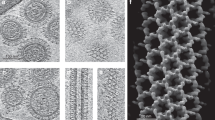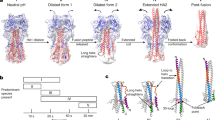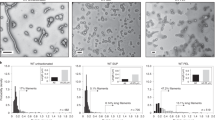Abstract
NEW proteins and glycoproteins appear on cell membranes after infection of the cells by type-C viruses1. Some of these new proteins are virus coded and are positioned in the membrane away from the sites of virus budding2. GP70, the major murine glycoprotein has been identified serologically on the membranes of virus-shedding cells3, transformed but non-virus-producing cells4, and on some chemically induced sarcomas5. The internal core protein p30 has been identified as a common antigen on membranes of type-C virus-infected cells of many species6. It has been suggested that this protein, possibly a product of degraded virus, can bind nonspecifically to virus-shedding cells5. Non-virion virus-coded antigens have also been described. The best characterised tumour-specific surface antigen (TSSA) is that found on avian sarcoma cells7. It consists of a major fucose-containing glycoprotein of molecular weight 100,000 and possibly a minor glycoprotein of 32,000. These glycoproteins do not cross react antigenically with the avian virion glycoproteins. A similar antigen, the feline oncornavirus membrane antigen (FOCMA), has been described on virus-infected feline cells8. This antigen has not been well characterised but it is also thought not to be related to the virion proteins. Evidence has been sought largely unsuccessfully for a comparable TSSA in murine model systems9. There have, however, been a few reports of sarcoma specific antigens10. In this paper we describe alterations which occur in membrane glycoproteins after infection of murine fibroblasts by Moloney leukaemia–sarcoma virus (MSV–MLV-M) and by an N-tropic virus isolated from leukaemic AKR mice (MLV–AKR). The technique of lectin chromatography is used to fractionate glycoproteins from other membrane proteins enabling better characterisation of these important surface molecules.
This is a preview of subscription content, access via your institution
Access options
Subscribe to this journal
Receive 51 print issues and online access
$199.00 per year
only $3.90 per issue
Buy this article
- Purchase on Springer Link
- Instant access to full article PDF
Prices may be subject to local taxes which are calculated during checkout
Similar content being viewed by others
References
Old, L. J., and Boyse, E. A., Fedn Proc., 24, 1009–1027 (1965).
Aoki, T., et al., Proc. natn. Acad. Sci. U.S.A., 65, 569–576 (1970).
Kennel, S. J., Del Villano, B. C., Levy, R. L., and Lerner, R. A., Virology, 55, 464–475 (1973).
Bilello, J. A., Strand, M., and August, J. T., Proc. natn. Acad. Sci. U.S.A., 71, 3234–3238 (1974).
Grant, J. P., Bigner, D. D., Fischinger, P. J., and Bolognesi, D. P., Proc. natn. Acad. Sci. U.S.A., 71, 5037–5041 (1974).
Yoshiki, T., Mellors, R. C., Hardy, W. D., and Fleissner, E., J. exp. Med., 139, 925–942 (1974).
Bauer, H., Rohrschneider, L., Kurth, R., Pauli, G., and Friis, R. R., in Proc. XIth Int. Cancer Congr., 1, 211–217 (Excepta Medica, Amsterdam, 1975).
Essex, M., Klein, G., Synder, S. P., and Harrold, J. B., Int. J. Cancer, 8, 384–390 (1971).
Strouk, V., et al., J. exp. Med., 136, 344–352 (1972).
Aoki, T., Stephenson, J. R., and Aaronson, S. A., Proc. natn. Acad. Sci. U.S.A., 70, 742–746 (1973); Aoki, T., Stephenson, J. R., Aaronson, S. A., and Hsu, K. C., Proc. natn. Acad. Sci. U.S.A., 71, 3445–3449 (1974).
Brunette, D. M., and Till, J. E., J. Membr. Biol., 5, 215–224 (1971).
Hayman, M. J., and Crumpton, M. J., Biochem. biophys. Res. Commun., 47, 923–930 (1972).
Nicolson, G. L., Blaustein, J., and Etzler, M. E., Biochemistry, 13, 196–204 (1974).
Studier, F. W., Science, 176, 367–376 (1972).
Vogt, V. M., Eisenman, R., and Diggelman, H., J. molec. Biol., 96, 471–493 (1975).
Van Zaane, D., Gielkens, A. L. J., Dekker-Micheilsen, M. L. A., and Bloemers, H. P. J., Virology, 67, 544–552 (1975).
Massicot, J. G., Woods, W. A., and Chirigos, M. A., Appl. Microbiol., 22, 1119–1122 (1971).
Laskey, E. A., and Mills, A. D., Eur. J. Biochem., 56, 335–341 (1975).
Herberman, R. B., et al., J. natn. Cancer Inst., 53, 1103–1111 (1974).
Zacharius, R. M., Zell, T. E., Morrison, J. H., and Woodlock, J. J., Analyt. Biochem., 30, 148–152 (1969).
Fischinger, P. J., and Nomura, S., Virology, 65, 304–307 (1973).
Author information
Authors and Affiliations
Rights and permissions
About this article
Cite this article
SMART, J., HOGG, N. Alteration in membrane glycoproteins after type-C virus infection of murine fibroblasts. Nature 261, 314–316 (1976). https://doi.org/10.1038/261314a0
Received:
Accepted:
Published:
Issue Date:
DOI: https://doi.org/10.1038/261314a0
This article is cited by
-
Viral infections, their influence on some parts of the immune system and glomerulonephritis development
International Urology and Nephrology (1987)
-
Glycoprotein analysis of middle ear effusions by rectin-conjugated sepharose affinity chromatography
Archives of Oto-Rhino-Laryngology (1986)
-
Antibody response to Moloney type C virus-induced tumours
Nature (1980)
-
Neue Ergebnisse zur biologischen und medizinischen Bedeutung von Glycoproteinen
Klinische Wochenschrift (1979)
-
Binding of ferritin-lectin conjugates to C-type virus in intact cells
Experientia (1977)
Comments
By submitting a comment you agree to abide by our Terms and Community Guidelines. If you find something abusive or that does not comply with our terms or guidelines please flag it as inappropriate.



